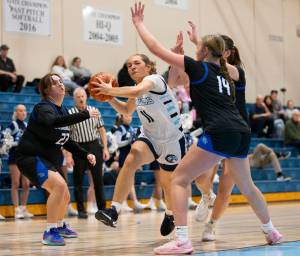Thiel: Mariners hoping ‘credibility’ makes up for lack of wins
Published 1:30 am Wednesday, June 26, 2019
By Art Thiel
For the Herald
The Mariners are upon a minor anniversary, one unlikely to inspire the sentimental fetes for which the club’s marketers are locally renowned. On July 5, 2018, the Mariners beat the Angels 4-1. Their ninth win in 10 games improved their record to 56-32, two games behind the Houston Astros in the American League West.
Since then, as you may have heard, the Mariners have plummeted so fast that NASA has offered to supply a heat shield for re-entry through mediocrity to a dull, but safe, thud in baseball’s cellar.
From that height, the Mariners lost seven of the next nine. Through Aug. 5, they would lose 15 of 22 to fall 7½ games back and render the season inert. When the 33-41 mark after July 5 is added to 2019’s 36-47 record entering Wednesday’s game in Milwaukee, the Mariners over the past 12 months a have a winning percentage of .439 (69-88).
That includes a 13-2 start to 2019 that increasingly looks as inexplicable as a rhino horn on a cat.
The one-year anniversary drips with irony, since general manager Jerry Dipoto had his contract extended by ownership July 6, followed by same for manager Scott Servais July 20. At the time, Servais gushed about the team’s prospects.
“We’ve had a great first half,” Servais told reporters the day his extension was announced. “I’m really looking forward to what’s ahead of us in the next two and half months. We’ve put ourselves in a great position.
“We’ve talked about bringing playoff baseball back to the Pacific Northwest. We’ve got a shot. It’s not going to be easy. And that’s the focus I want on the remainder of this season, not on this contract, but how good can we be.”
Servais found out.
He wasn’t quite on a par with Microsoft CEO Steve Ballmer’s 2007 forecast that the iPhone was never going to get any significant market share. But the words will find a place in local infamy. (Hey, I may have written one or two columns where a prediction failed to work as I foresaw.)
The topic of credibility came to mind not only because of the anniversary, but from something majority owner John Stanton said. In an interview with the Seattle Times’ Ryan Divish published this week, Stanton mused about how he squares up the Mariners’ “step back” strategy for long-term success with a fan base that is historically starved for success.
“I don’t want to say we expected (the poor play), but we certainly knew it was a strong possibility when we announced the step-back policy,” Stanton said. “The alternative was we didn’t say it was a step back, did a bunch of things that were baffling to people and then lost credibility. Credibility is really important to me with our fans.
“Some number of fans are passionate, and they will be here through thick and thin, and have been for 30 years. But others won’t. I want the fans to believe this is going to be a championship team in the next few years. And to be here, or watching it on television, when we are.”
It’s good to hear Stanton wants to be credible with fans, something his CEO predecessor, Howard Lincoln, didn’t prioritize. The fact that Dipoto was up front in October about plans to dump a lot of veterans in exchange for prospects, making 2019 something only a vulture could enjoy (my expression, not his), was good, but really the mandatory minimum that needed to be done.
As the team with the longest active absence from the postseason among the four major North American sports, futility transcends all the changes in players, managers, general managers and bobbleheads. More than perhaps any other MLB ownership group, this group has to break form with a tepid past.
Because of all the incompetence and treacheries that have gone before him, Stanton can’t just want fans to believe in a future. Down the road, he has to act.
The Mariners’ first ownership group (1977-81), led by entertainer Danny Kaye and five local businessmen, was underfunded and overextended. They sold to George Argyros (1981-89), an Orange County real estate developer who cared nothing about Seattle and everything about turning a profit. He sold to Jeff Smulyan (1989-1991), an earnest radio mogul from Indianapolis whose secret agenda (with assent from other MLB owners) was to pull the franchise out of Seattle to Tampa.
Then in 1992, Nintendo founder Hiroshi Yamauchi of Japan was surfaced by then-Sen. Slade Gorton to cash out Smulyan. Baseball owners, filled with xenophobic fear of a non-American owner, fought the sale hard until shamed nationally into submission.
The team’s only run of success — four playoff appearances in seven years — happened under Yamauchi’s tenure. But in the 21 years before his death in 2013, the eccentric billionaire never saw a game in person and never gave more than a cursory few remarks about MLB ownership.
He appointed Nintendo of America’s lead counsel, Lincoln, to look after his baseball interests. Lincoln had neither baseball nor retail experience. When NOA inherited the team, its interest was mostly in countryman Ichiro Suzuki and asset appreciation.
Stanton knows the dubious ownership history well. As a born-and-raised lifer here — the first such majority owner in club history — he’s lived it. He’s been a part-owner since 2000, and actively engaged in youth and independent-league baseball.
But besides the second-half collapse, last year on his watch was a sexual harassment scandal from years past, which included club president Kevin Mather, that tainted the front office. After a single season, Dipoto fired his ballyhooed director of high performance, Dr. Lorena Martin, who is suing for wrongful termination. And Robinson Cano embarrassed himself and the franchise with an 80-game suspension for performance-enhancing drugs.
Whether Stanton could have done something to avert any of these misdeeds is difficult to say. But he’s the guy now saying he “wants the fans to believe this is going to be a championship team in the next few years.”
Acceptance of that desire is a matter of faith, not facts. At best, the faith wanes.
If and when the time comes that the Mariners do contend, Stanton and his partners need to honor the indulgences of the disaffected with a player-payroll checkbook that is nearly as infinite as the baseball sordidness that preceded the moment.
Art Thiel is co-founder of sportspressnw.com




